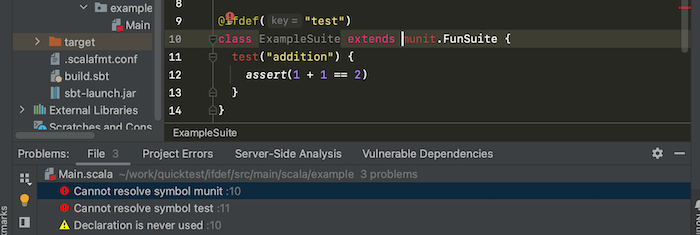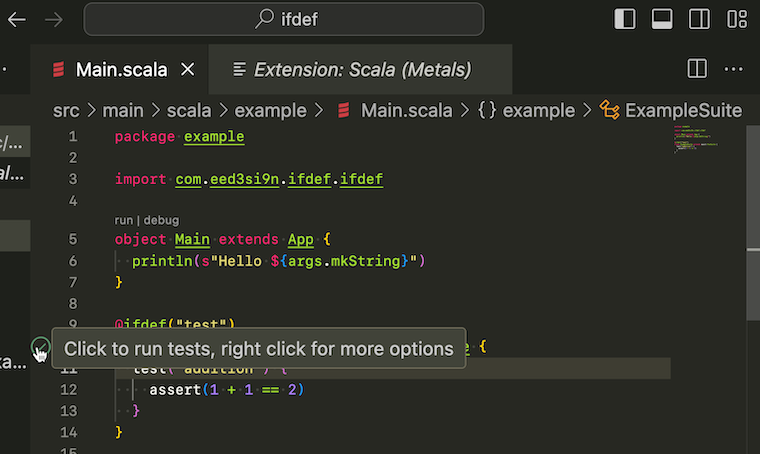ifdef in Scala via pre-typer processing
This is part 2 of implementing Rust’s cfg attribute in Scala. In part 1, I tried the annotation macro with a mixed result. I’ve implemented a version of @ifdef that works better.
what does cfg attribute do?
Rust Programming Language says:
Rust has a special attribute,
#[cfg], which allows you to compile code based on a flag passed to the compiler.
This lets us write unit test in the same source as the library code like this:
...
#[cfg(test)]
mod tests {
#[test]
fn some_test() {
...
}
}
When I first heard about this, it sounded a bit absurd since I’ve never used languages that embeds tests into the main source code. But now that I’ve been working with Rust occasionally, I like the idea of being able to write the tests in the same source, especially for kind of code that can be exercised as functions. When it gets too messy, you can always split them out in src/test/scala/ or tests/ in Rust.
problem with 0.1.0 (annotation macro)
In part 1, I tried the annotation macro with a mixed result. I tried to use annotation macro feature in earnest, but I don’t think it’s powerful enough to implement @ifdef.
- It worked better in Scala 2.x, but the product JARs still contained empty
ATestclass etc, so in that sense it was not good. - It didn’t work in Scala 3 since it required test libraries (like MUnit) during compilation, and it also left behind
extends munit.FunSuite.
Later I’ve filed dotty#18677. From the discussion, it seems like annotation macro, which works post-typer, is fundamentally not intended for removing classes and methods. In general, the approach Scala 3 takes with metaprogramming is to first perform typechecking, and carry that context into user-defined quotations. For general macros, I think that’s a great approach, but we also want something close to a code generator that can change the shape of the code.
pre-typer processing
We can implement conditional compilation, if we operate pre-typer. The Scala compiler, either Scala 2.x or 3.x, consists of series of phases. You can see the list of phases by running scalac -Xshow-phases. Scala 3, for instance has over a hundred phases:
$ scalac -Xshow-phases
phase name description
---------- -----------
parser scan and parse sources
typer type the trees
checkUnusedPostTyper check for unused elements
inlinedPositions check inlined positions
sbt-deps sends information on classes' dependencies to sbt
extractSemanticDB extract info into .semanticdb files
posttyper additional checks and cleanups after type checking
prepjsinterop additional checks and transformations for Scala.js
sbt-api sends a representation of the API of classes to sbt
SetRootTree set the rootTreeOrProvider on class symbols
pickler generates TASTy info
inlining inline and execute macros
postInlining add mirror support for inlined code
checkUnusedPostInlining check for unused elements
staging check staging levels and heal staged types
splicing splicing
... 99 more phases ...
genBCode generate JVM bytecode
The first phase, parser, converts the Scala text into untyped abstract syntax tree untpd.Tree. The second phase, typer, does the typechecking and creates typed abstract syntax tree tpd.Tree. We can think of typechecking to be where we do typo checking. If your code uses some external library code without import etc this is where it would fail.
So if we wanted to remove classes and methods during Compile/compile, we need to do so before typer gets to our test code. This is somewhat analogous to code generation at build tool level, Scalafix’s syntactic rewrite, and what I wanted to do with treehugger.scala in 2012, except it would be part of the compilation. Scala compiler makes it easy to inject custom phases.
pre-typer processing in Scala 3
The boilderplate for a pre-typer plugin looks like this in Scala 3:
package com.eed3si9n.ifdef.ifdefplugin
import dotty.tools.dotc.CompilationUnit
import dotty.tools.dotc.core.Contexts.Context
import dotty.tools.dotc.plugins.{ PluginPhase, StandardPlugin }
import dotty.tools.dotc.parsing.Parser
class IfDefPlugin extends StandardPlugin:
val name: String = "ifdef"
override val description: String = "ifdef preprocessor"
def init(options: List[String]): List[PluginPhase] =
(new IfDefPhase) :: Nil
end IfDefPlugin
class IfDefPhase extends PluginPhase:
val phaseName = "ifDef"
override def runsAfter: Set[String] = Set(Parser.name)
override def runOn(units: List[CompilationUnit])(using ctx: Context): List[CompilationUnit] =
val unitContexts =
for unit <- units
yield ctx.fresh.setPhase(this.start).setCompilationUnit(unit)
unitContexts.foreach(preprocess(using _))
unitContexts.map(_.compilationUnit)
def preprocess(using ctx: Context): Unit =
val unit = ctx.compilationUnit
try
if !unit.suspended then
// todo: implement M
unit.untpdTree = (new M).transform(unit.untpdTree)
catch case _: CompilationUnit.SuspendException => ()
end IfDefPhase
Next, we need to implement M that walks the untyped AST, and transforms it to a new tree. Since it’s a common operation in compiler, there’s a data structure called TreeMap to help us with this. We will be using a variant called UntypedTreeMap.
UntypedTreeMap
To transform an untyped tree, we override the transform method, and make sure that any cases we don’t handle fall back to super.transform.
class M extends UntypedTreeMap:
val eval = IfDefExpr.eval(keys)
override def transform(tree: Tree)(using Context): Tree =
tree match
case tree: DefTree => transformDefn(tree.mods.annotations)(tree)
case _ => super.transform(tree)
// transform any definitions, includinng classes and `def`s
def transformDefn(annots: List[Tree])(tree: Tree)(using Context): Tree =
annots.iterator.map(extractAnnotation).collectFirst {
case Some(expr) =>
if eval(expr) then super.transform(tree)
else EmptyTree
}.getOrElse(super.transform(tree))
An enhancement I’ve made for ifdef 0.2.0 is that it can handle any definitions, including class and def.
demo (Scala 3.3.0)
import com.eed3si9n.ifdef.ifdef
class A:
def foo: Int = 42
@ifdef("test")
class ATest extends munit.FunSuite:
test("foo"):
val actual = new A().foo
val expected = 43
assertEquals(actual, expected)
Here are results of compiling and testing the code:
sbt:ifdef root> app/compile
[info] compiling 1 Scala source to ifdef/app/target/scala-3.3.0/classes ...
[success] Total time: 5 s
sbt:ifdef root> app/test
[info] compiling 1 Scala source to ifdef/app/target/scala-3.3.0/test-classes ...
ATest:
==> X ATest.foo 0.052s munit.ComparisonFailException: ifdef/app/app.scala:26
25: val expected = 43
26: assertEquals(actual, expected)
values are not the same
....
sbt:ifdef root> exit
$ ls app/target/scala-3.3.0/classes
A.class A.tasty
This shows that app/compile will ignore munit.FunSuite, but app/test will see it. Note that we no longer have the *.class file for ATest! This is an improvement over the previous attempt.
demo (Scala 2.13)
The same plugin can be implemented Scala 2.x as well, and here are the results:
sbt:ifdef root> app/scalaVersion
[info] 2.13.12
sbt:ifdef root> app/compile
[info] compiling 1 Scala source to app/target/scala-2.13/classes ...
[success] Total time: 1 s
$ ls app/target/scala-2.13/classes
A.class
Also missing ATest.class, which is great.
ifndef
To implement if-else, in 0.2.0 I’ve also implemented @ifndef(...).
val IfDefName = Names.termName("ifdef").toTypeName
val IfNDefName = Names.termName("ifndef").toTypeName
def extractAnnotation(annot: Tree)(using ctx: Context): Option[IfDefExpr] =
annot match
case Apply(Select(New(Ident(IfDefName)), _), List(arg)) =>
Some(IfDefExpr.IfDef(extractLiteral(arg)))
case Apply(Select(New(Ident(IfNDefName)), _), List(arg)) =>
Some(IfDefExpr.IfNDef(extractLiteral(arg)))
case _ => None
def extractLiteral(arg: Tree): String =
arg match
case Literal(Constant(x)) => x.toString
case _ => sys.error(s"invalid arg $arg")
enum IfDefExpr:
case IfDef(arg: String)
case IfNDef(arg: String)
object IfDefExpr:
def eval(env: Set[String])(expr: IfDefExpr): Boolean =
expr match
case IfDefExpr.IfDef(arg) => env(arg)
case IfDefExpr.IfNDef(arg) => !env(arg)
end IfDefExpr
To the compiler, annotations look like function calls in the shape of new ifndef()("test"). extractAnnotation pattern matches to the shape and returns an option of enum.
ifndef usage
Here’s a simple demo of conditional compilation of def, and using @ifndef:
import com.eed3si9n.ifdef.{ ifdef, ifndef }
class A:
@ifdef("compile")
def bar: Int = 1
@ifndef("compile")
def bar: Int = 2
@ifdef("test")
class ATest extends munit.FunSuite:
test("bar"):
val actual = new A().bar
val expected = 2
assertEquals(actual, expected)
It would probably be more useful for situations where we have more than two options, but this shows that we can do if-else pre-typer processing at compile-time, without causing compilation errors.
Scala cross building
One example that often comes for conditional compilation for Scala is cross building that we already do using sbt. We can lift sbt settings like scalaBinaryVersion as ifDefDeclarations as follows:
ifDefDeclarations ++= {
val sbv = scalaBinaryVersion.value
List(
configuration.value.name,
s"scalaBinaryVersion:$sbv",
)
},
Scala cross building usage
Combining with @ifndef, here we can define a method for Scala 3.x and 2.x separately:
import com.eed3si9n.ifdef.{ ifdef, ifndef }
class A {
@ifdef("scalaBinaryVersion:3")
def foo: String = "3"
@ifndef("scalaBinaryVersion:3")
def foo: String = "2.x"
}
@ifdef("test")
class ATest extends munit.FunSuite {
test("foo") {
val actual = new A().foo
assert(Set("3", "2.x")(actual))
}
}
IDE integration
One of the concerns of using compiler plugins is that tooling is going to suffer. I think this is a valid concern, but that could apply to any form of metaprogramming essentially. An interesting aspect of pre-typer processing is that we can modify the code before tooling phases, such as sbt-deps and SemanticDB generation, so it’s possible that we have less impact. We can check.
IntelliJ Scala plugin 2023.2.27
I used the default sbt import with the option to build using sbt shell checked, but it didn’t seem to work.

In the above, we see that the class annotated @ifdef("test") with causing errors.
Metals 1.0.1
Metals on VS Code seems to be ok with the annotation. It even recognizes the @ifdef("test") as actual test:

I didn’t do anything special to import the project other than using sbt as the build server.
setup
Put this in project/plugins.sbt:
addSbtPlugin("com.eed3si9n.ifdef" % "sbt-ifdef" % "0.2.0")
Source is available at https://github.com/eed3si9n/ifdef
Note that the sbt plugin adds the following dependencies to your subprojects:
libraryDependencies += "com.eed3si9n.ifdef" %% "ifdef-annotation" % ifDefVersion % Provided,
libraryDependencies += compilerPlugin("com.eed3si9n.ifdef" %% "ifdef-plugin" % ifDefVersion),
This does leak to the POM as:
<dependency>
<groupId>com.eed3si9n.ifdef</groupId>
<artifactId>ifdef-annotation_2.13</artifactId>
<version>0.2.0</version>
<scope>provided</scope>
</dependency>
But it shouldn’t affect the dependency graph, since provided will be ignored.
summary
@ifdefis an experimental annotation that implemented via pre-typer processing.- Unlike 0.1.0 using annotation macros, pre-typer processing is capable of removing classes and methods from the final compilation results.
- ifdef 0.2.0 is capable of annotating any definitions including
def. - ifdef 0.2.0 adds supports for negation
@ifndef. - ifdef 0.2.0 also surfaces sbt’s
scalaBinaryVersionsetting, which enables cross building using the same source file.